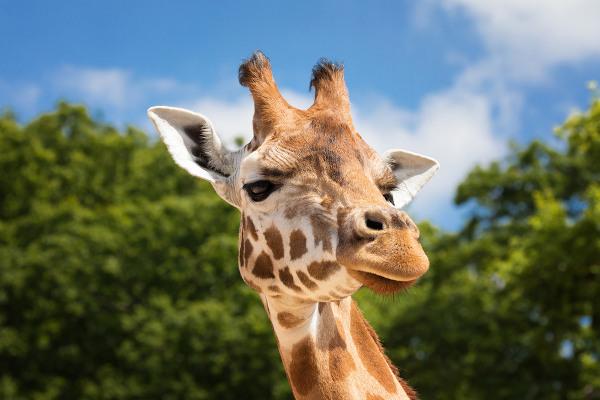At giraffes they are mammals natives of continent TheAfrican. Some of the most striking features of these animals are their height and color pattern, with characteristic brown spots. Are animals herbivores(they only feed on vegetables) which have as one of their favorite foods the plants known as acacia. Females usually give birth to a single offspring.
This species is currently classified as vulnerable by the IUCN Red List of Endangered Species, and the population trend is towards a reduction in the number of individuals. THE habitat loss and illegal hunting are some of the threats to these animals.
read also: Red List of Endangered Species
Giraffe scientific name
The giraffe's scientific name is Giraffa camelopardalis. See the table Next the others taxonomic categories in which the giraffe is inserted:
Giraffe taxonomic classification |
|
Kingdom: animalia Phylum: Chordata Class: Mammalia Order: Cetarthiodactyla Family: Giraffidae Gender: Giraffe Species: Giraffa camelopardalis |
It is important to make it clear that, currently,
General characteristics of the giraffe
giraffes are animals big ones, having a size of about 5.7 m tall, and males are larger than females. The weight of these mammals varies between 1180 kg and 1930 kg.
Giraffes have long legs, the front legs being longer than the hind legs, and also a rather long neck. They have a tail that can be about 100 cm long. This animal's eyes are large and its tongue can reach approximately 45 cm in length, which is an important feature in capturing food.
Its coat has a characteristic pattern, and it is possible to distinguish several stains all overus of brown. This pattern of smudges works like our fingerprints, being different for each individual. The color of giraffes is important in the camouflage process. It is worth noting that, depending on the animal's health status and even the season of the year, the coat color may to introduce variations.

On the heads of giraffes, it is possible to notice the presence of two bone structures covered with skin and hair. These structures are special horns called ossicons, which are formed from a bone that fuses with the frontal bone during development.
Giraffes live in groups that have about 10 to 20 individuals, but larger groups may exist as well as individuals isolated in nature. In the group, there is a dominant male.
Your main predators are lions, but leopards, hyenas and even crocodiles can also feed on giraffes. It is noteworthy that, normally, sick animals, very young or elderly people are the most downtrodden.
Read too: Horns and horns - learn the difference between these two structures
Giraffe Habitat
giraffes are animals found only on the mainland TheAfrican. According to the International Union for the Conservation of Nature (IUCN), they inhabit 18 African countries and have been reintroduced in other 3. They live in savannas, grasslands and also in open forest regions. are very common in acacia-rich areas, one of the plants that are part of your diet. A curious fact is that, as they do not drink water frequently, they can be found in environments where there is no water source.

Giraffe feeding
Giraffes are herbivorous animals, that is, they feed exclusively on products of plant origin. Their diet includes leaves, stems, flowers and fruits. Despite feeding on several plant species, some plants are preferred by giraffes, such as the acacias.
Acacia is a plant with thorns, but the giraffe is able to remove the leaves with its tongue without getting hurt. In addition, the giraffe's molar teeth can crush these spines, and the flexible lips help to pick up food.
Giraffe reproduction
Female giraffes reach their sexual maturity at 3 to 4 years of age, andOs males, with 4 to 5 years. Despite reaching maturity at this age, the male only begins to reproduce around 7 years of age.
The female reproduces every 20 to 30 months, and gestation lasts about 460 days. Usually, there is the birth of a single offspring. The hatchlings take place in the dry season, between May and August. Weaning, in turn, takes place between 12 and 16 months for females and between 12 and 14 months for males. These animals can take a while 1 The 3 years to become independent. Females tend to stay in the group, while the male may migrate in search of another group in which they can.wow become the dominant one.
Read too:Elephant – check out the characteristics of this amazing mammal!
Curiosities about giraffes

Curiosities about giraffes |
|
By Vanessa Sardinha dos Santos
Biology teacher
